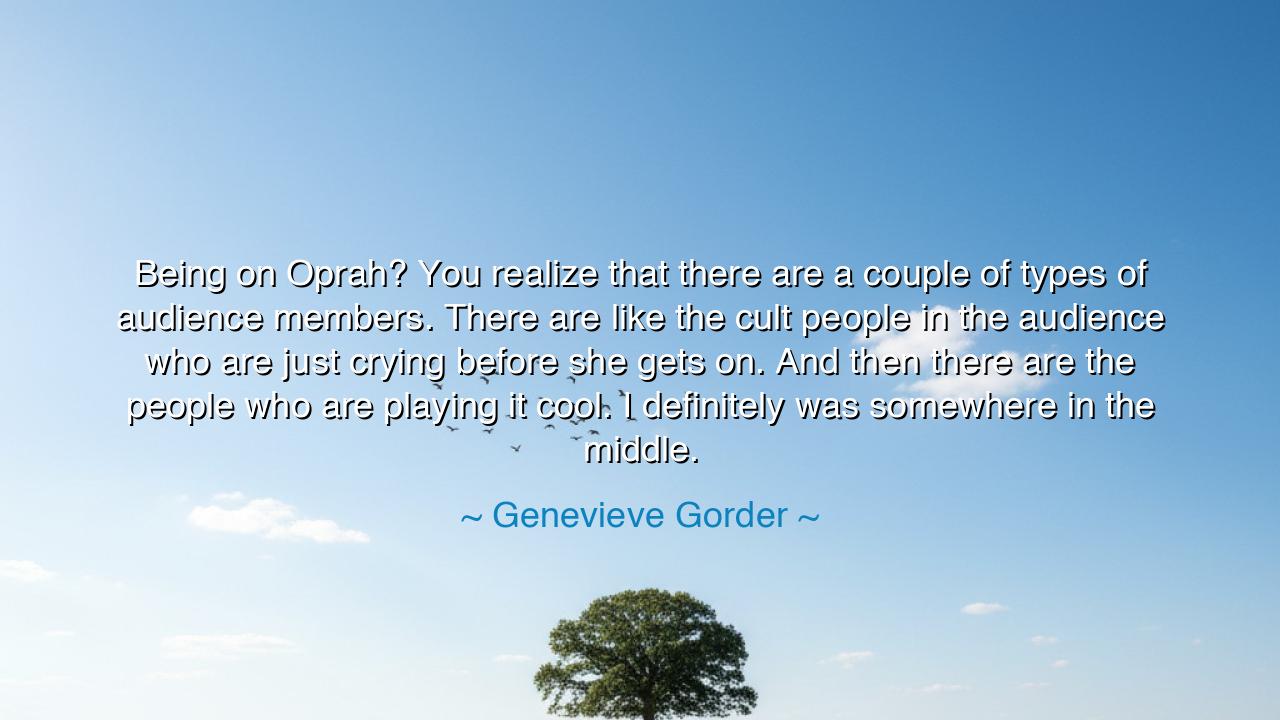
Being on Oprah? You realize that there are a couple of types of
Being on Oprah? You realize that there are a couple of types of audience members. There are like the cult people in the audience who are just crying before she gets on. And then there are the people who are playing it cool. I definitely was somewhere in the middle.






"Being on Oprah? You realize that there are a couple of types of audience members. There are like the cult people in the audience who are just crying before she gets on. And then there are the people who are playing it cool. I definitely was somewhere in the middle." These words from Genevieve Gorder speak to the varying emotional responses people experience when confronted with something larger than life—something that inspires both awe and admiration. In her reflection on her appearance on Oprah, Gorder highlights the contrast between the two types of audience members: those who are completely swept up in the emotion of the moment, and those who try to maintain their composure, remaining unaffected. In this, Gorder touches on a fundamental human experience—the way in which we interact with those who hold great influence and the way our emotions both guide and betray us.
In ancient cultures, great figures were often surrounded by awe-struck followers, people who believed in their power to shape the world. The ancient Greeks had their gods and heroes, figures whose very names would send tremors through the hearts of those who worshipped them. Alexander the Great, for example, was not just a conqueror; he was idolized, almost deified by his men, who followed him not just out of loyalty, but out of a profound belief in his destiny. The power of leaders, whether gods or kings, often inspired deep emotional responses from their followers—responses that ranged from ecstasy to devotion. In contrast, there were those who remained more reserved, acknowledging the leader’s greatness, but not allowing themselves to be swept away by emotion. Like Gorder, they were somewhere in the middle—still affected, but maintaining control.
Consider the moment when Julius Caesar returned to Rome after his victories in Gaul. As he marched through the streets, crowds cheered, some in tears, some too stunned by the sheer spectacle to react at all. The response was not universal—while many were swept away by the emotion of the moment, others observed with a more critical eye, weighing Caesar’s rise not just as an event of celebration, but one that would forever change the nature of Roman power. The same duality of reaction can be seen in the audience of great figures like Oprah—some are moved to tears by the sheer weight of her influence, while others remain cool and collected, holding back their feelings.
In the modern world, celebrities and public figures often elicit similar responses, especially those who have cultivated a cult of personality. The power of figures like Oprah Winfrey lies not just in their accomplishments but in the emotional connection they foster with their audience. Oprah, in particular, has built an empire not merely on the ideas she shares, but on her ability to connect with her audience on a deep emotional level. For many, her presence is an overwhelming force that taps into something profound within. And yet, there are always those who remain more detached, recognizing her greatness but maintaining a sense of objectivity. Gorder, in her reflection, finds herself between these two extremes—acknowledging the emotion, but not fully surrendering to it.
The lesson we can take from Gorder’s words is that emotional response is not something to be feared or avoided, but understood. Just as Oprah has the power to bring people to tears, there is a deeper wisdom in learning to manage the tension between being moved and maintaining a sense of composure. In ancient times, those who could maintain their balance in the face of overwhelming emotion were often considered the wisest and most courageous. The philosopher Aristotle spoke of virtue as the balance between excess and deficiency, and this balance is key in how we engage with the world’s powerful figures. Too much detachment leads to indifference, while too much emotion leads to loss of control. The ideal is to find the middle ground, where we can appreciate the moment and the power of others without being consumed by it.
Gorder’s self-awareness in the face of Oprah’s influence offers an important example for us all. In the world we inhabit today, where we are bombarded by influence from all sides—be it from political leaders, celebrities, or even social media influencers—it is essential to recognize the power of balance in our emotional responses. To be moved by others’ greatness is a natural part of the human experience, but we must be mindful not to surrender too much of ourselves to the emotions others provoke in us. Like the ancients who could stand before great rulers with awe but also with a sense of measured judgment, we too can learn to navigate the complexities of admiration, influence, and self-awareness.
The lesson, then, is to embrace our emotional responses to the figures and events that shape our world but to do so with self-awareness and control. Just as Gorder found her place between the extremes of emotional devotion and detached composure, so too must we learn to manage our emotions in the face of influence. Oprah, Caesar, and other figures may elicit deep feelings, but it is wisdom that allows us to recognize these feelings and still maintain our balance. By understanding and mastering our emotional responses, we can navigate the world of influence without losing ourselves in the process. Find the middle ground, appreciate the greatness around you, but never forget the strength that comes from staying centered.






AAdministratorAdministrator
Welcome, honored guests. Please leave a comment, we will respond soon